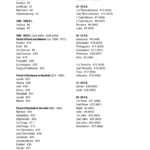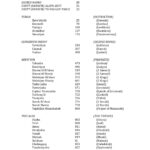The 39 books of the Old Testament have served as the foundation for, or inspiration behind, many paintings, songs, and works of fiction. The Old Testament is full of stories about ancient kings, intrepid soldiers, and God’s unfailing mercy. These stories have been a source of entertainment for countless people over many generations. The books that make up the Old Testament are filled with characters who influenced the development of Western civilization and religion.
The Bible is a wonderful book. It contains a wealth of stories that can teach us much about God and living as a human being, however one thing I always find tiresome are the preachers who read chapters out of order, or skip over some parts.
Right here on Churchgists, you are privy to a litany of relevant information on books of the new testament in chronological order, chronological order of the bible including apocrypha, what are the 39 books of the old testament, and so much more. Take out time to visit our Website for more information on similar topics.
39 Books Of The Old Testament In Chronological Order

The 39 books of the Old Testament are arranged in chronological order, from Genesis to Malachi.
The first two books, Genesis and Exodus, were written by Moses around 1400 BC—the same time King David was ruling over Israel. These books tell the story of God’s relationship with Abraham and his descendants, as well as with Moses and the Israelites.
The next book, Leviticus, was written around 250 years later by Aaron or another priest of Israel. This book explains how to worship God properly. It also contains general laws for living in a community (like not stealing).
Numbers was written during Moses’ lifetime as well as after he died by Joshua, who led the Israelites through the desert into Canaan (modern-day Israel).
Deuteronomy was written by Moses before he died but after Joshua had led the Israelites into their new homeland at Mount Nebo near Jordan River Valley. This book summarizes all of Moses’ teachings on how to live righteously before God so that they would receive blessings from Him.
The 39 books of the Old Testament are arranged in three sections: the Law, the Prophets and the Writings.
The Law includes the first five books of the Bible (Genesis, Exodus, Leviticus, Numbers and Deuteronomy). The Prophets are made up of twelve books (Joshua, Judges, 1 Samuel, 2 Samuel, 1 Kings, 2 Kings, Isaiah, Jeremiah, Ezekiel, Daniel and Hosea). The Writings include all the remaining Old Testament books except Daniel.
The 39 books of the Old Testament are:
Genesis, Exodus, Leviticus, Numbers, Deuteronomy, Joshua, Judges, Ruth, 1 Samuel, 2 Samuel, 1 Kings, 2 Kings, 1 Chronicles?, 2 Chronicles?, Ezra, Nehemiah?, Esther?, Job?, Psalms (1-50), Proverbs (1-15), Ecclesiastes? Song of Solomon? Isaiah 1-39; 40-66; Jeremiah 1-45; Lamentations? Ezekiel? Daniel? Hosea? Joel? Amos? Obadiah? Jonah? Micah? Nahum? Habakkuk? Zephaniah? Haggai? Zechariah 1-8; 9-14; Malachi.
Genesis, Exodus, Leviticus, Numbers, Deuteronomy, Joshua, Judges, Ruth, 1 Samuel, 2 Samuel, 1 Kings, 2 Kings, 1 Chronicles, 2 Chronicles, Ezra, Nehemiah [6 books], Esther [2 books], Psalms [5 books], Proverbs [3 books], Ecclesiastes [1 book], Song of Solomon [1 book], Isaiah [2 books], Jeremiah [2 books], Lamentations [1 book], Ezekiel [3 books], Daniel [2 books], Hosea [3 books], Joel [1 book], Amos [3 books], Obadiah [1 book], Jonah (or Jonah), Micah (or Micah), Nahum (or Nahum), Habakkuk (or Habakkuk), Zephaniah (or Zephaniah), Haggai (or Haggai), Zechariah (or Zechariah), Malachi
- Genesis
- Exodus
- Leviticus
- Numbers
- Deuteronomy
- Joshua
- Judges
- Ruth
- 1 Samuel
Chronological Order of the Bible including Apocrypha
The Bible is long and complicated, so it can be a bit hard to keep it all straight. The scriptures contain hundreds of stories over generations. Christian Bibles, which borrow heavily from the Hebrew Tanakh, are broken down into different books; we’ve presented the full list of books in order for your reference.
As we discuss below, different traditions count different books and order them differently. We’ve decided to present them here in the order used in most mainline Protestant Bibles, as those are the most common variety in the United States where we’re based.
See also The King James Bible, Old Testament Names, and Kings of Judah & Israel
Looking to broaden your religion reading? Check out our list of the best books on Buddhism.
What Are the 46 Books of the Old Testament in Order?
The Hebrew Scriptures
Genesis
Exodus
Leviticus
Numbers
Deuteronomy
Joshua
Judges
Ruth
1 Samuel
2 Samuel
1 Kings
2 Kings
1 Chronicles
2 Chronicles
Ezra
Nehemiah
Esther
Job
Psalms
Proverbs
Ecclesiastes
Song of Solomon (or Song of Songs)
Isaiah
Jeremiah
Lamentations
Ezekiel
Daniel
Hosea
Joel
Amos
Obadiah
Jonah
Micah
Nahum
Habakkuk
Zephaniah
Haggai
Zechariah
Malachi
What Are the Books of the New Testament in Order?
Matthew
Mark
Luke
John
Acts of the Apostles
Romans
1 Corinthians
2 Corinthians
Galatians
Ephesians
Philippians
Colossians
1 Thessalonians
2 Thessalonians
1 Timothy
2 Timothy
Titus
Philemon
Hebrews
James
1 Peter
2 Peter
1 John
2 John
3 John
Jude
Revelation
The Apocryphal and Deuterocanonical Books
The Apocrypha/Deuterocanonical
Tobit
Judith
Additions to the Book of Esther
Wisdom of Solomon
Ecclesiasticus
Baruch
The Letter of Jeremiah
The Prayer of Azariah and the Song of the Three Jews
Susanna
Bel and the Dragon
1 Maccabees
2 Maccabees
1 Esdras
Prayer of Manasseh
Psalm 151
3 Maccabees
2 Esdras
4 Maccabees
The Hebrew Scriptures & the Old Testament
The first books in the Christian bible are the holy books of the Jewish faith, collected in the Tanakh. “Tanakh” is an acronym of the three major division of the Hebrew holy book–the Torah (“teachings,” also known to Christians by the Greek name “the Pentateuch” or “five books”), Nevi’im (“prophets”), and Ketuvim (“writings”). In Christian traditions these books are called “the Old Testament.” The Jewish faith also adheres to the teachings in the Talmud, rabbinical commentaries on the Tanakh; unlike the Tanakh, Christian scripture does not recognize the Talmud.
Different Christian traditions acknowledge different books of the Bible as canonical. The Tanakh includes only 24 books, while mainline Protestant bibles inclue 39*, Catholics include 46, and Eastern Orthodox groups include 49. The books included in some bibles and not others are called Apocrypha or Deuterocanonical; this means either that they are not canon, or that they are less canonical than primary canon.
*Protestant bibles do not include more material than Hebrew bibles, but they divide the book of the 12 minor prophets into 12 different books, as well as dividing the book of Ezra-Nehemiah into the books of Ezra and Nehemiah, and the book of Chronicles into 1 Chronicles and 2 Chronicles. All Christian bibles, however, are ordered differently than the Tanakh.
The Five Books of Moses/the Pentateuch
The only set of books included in all forms of the Tanakh and the Old Testament, in the same order, is the Torah or Pentateuch. These five books, the five books of Moses, are the first and arguably most important books in the scripture.
An Overview of the Old Testament & the New Testament
The Old Testament begins with the book of Genesis, which tells the story of how the world was created, and how God anointed his chosen people and taught them how to live. This includes famous stories like those of Adam and Eve, Cain and Abel, and Noah’s Ark.
After Genesis, the different books of the Old Testament relate the trials of the Israelites as they endure centuries of enslavement or captivity under different empires. There is a general pattern where God sends a prophet to teach the Israelites how to live and to lead them from hardship, but over time they lose faith and find themselves suffering new hardships. The most famous example is Moses leading his people out of slavery in Egypt–the people are impious and must wander the desert for forty years before their descendants can enter the promised land.
Some of the other important episodes from the Old Testament include the rise of King David, the building of the Temple in Jerusalem, and the Babylonian Captivity. The Old Testament also includes various sayings and songs about morality, god, and other esoteric subjects.
The New Testament is concerned with the life and teachings of Jesus Christ, which are the basis for Christianity. His life story is told in the four Gospels (which comes from the Old English for “good news”). Almost all of the other books are letters written by Saint Paul or other Christian teachers, discussing their beliefs or giving advice.
The last book of the New Testament is the Book of Revelation, written by John the Apostle, which recounts an apocalyptic vision of the End of Days. The most important event discussed in Revelation is the Second Coming of Christ, although most of the events in Revelation are controversial in their meaning.
Notes on Biblical Terms
There are a few cases of terms that crop up a lot in the books of the bible, but that get confused in everyday language. We just want to focus in on two; the different terms for “God’s chosen people” in the Bible, and how God is identified and named.
The terms “Hebrew,” “Jew,” and “Israelite” are often used interchangeably, but they do mean slightly different things, as addressed in this informative post from Chabad.
The first person identified as a Hebrew is Abraham, and so in a sense the Hebrews are descendants of Abraham. More specifically, the etymology of Hebrew implies an individual who is across or has crossed something, and so it is often used to describe the people of Abraham when not in Israel/Canaan, and when resisting cultural pressures and temptations from outside groups. Joseph is called a Hebrew when in Egypt. Lastly, Hebrew is often used to refer to the Hebrew-speaking Jews of Roman Judaea.
Israelite more specifically refers to descendants of Jacob or Israel, the ancestor of the twelve tribes of Israel who later would be split between the kingdoms of Israel and Judah. It is important to note that Israelite is different from the current national demonym Israeli, indicating a person from the country of Israel.
Jew, lastly, refers to the people of Judah, and then after the Babylonian exile to Israelites more broadly due to cultural and religious importance of Judah. In general, Jew or Jewish person is used to refer to a person who practices Judaism or is part of the Jewish community. Due to its invective use by anti-semites, the word “Jew” by itself can sometimes sound harsh or rude, but there are many cases in which it’s perfectly neutral and appropriate.
The Name of God
In the Tanakh, God is identified with the seven different names. Per tradition, these are to be treated with extreme reverence; you shouldn’t erase or damage them when written down. For that matter, despite our academic use of them here, you’re not supposed to write them down too often either.
The most significant name for God in the Tanakh is the Tetragrammaton, or the four letters. The four letters are transliterated as YHWH. In Latin, since the letter J originally was pronounced like a Y or I, and the letter V sounded like a W, this was written JHVH (from which we get “Jehovah,” as in the Witnesses). Since you’re not supposed to write the name down too often, it’s common to change a letter (in English this is often written as G-d) or to space the letters, like Y-H-W-H.
Especially in Judaism, but in many Christian traditions as well, you are not supposed to pronounce the Tetragrammaton. When referring to the name itself, one would typically same HaShem (“The Name” in Hebrew). When reading the four letters, it is pronounced Adonai (or “The Lord”). If the word “Lord” is already next to the four letters, you would say Elohim. This is how we arrive at the common English phrase “the Lord God.”











